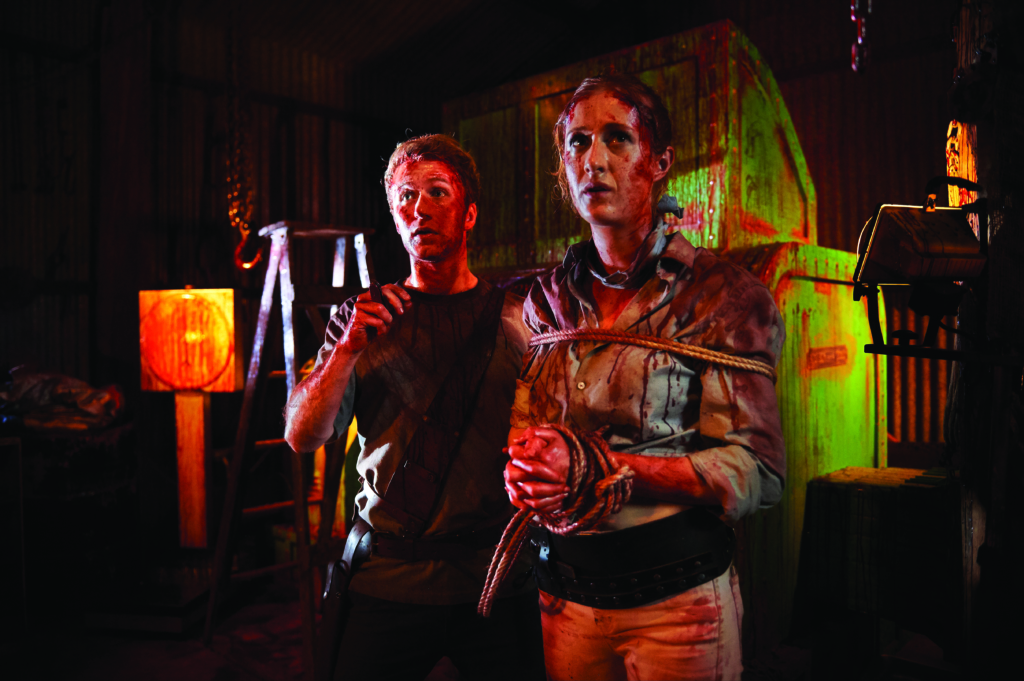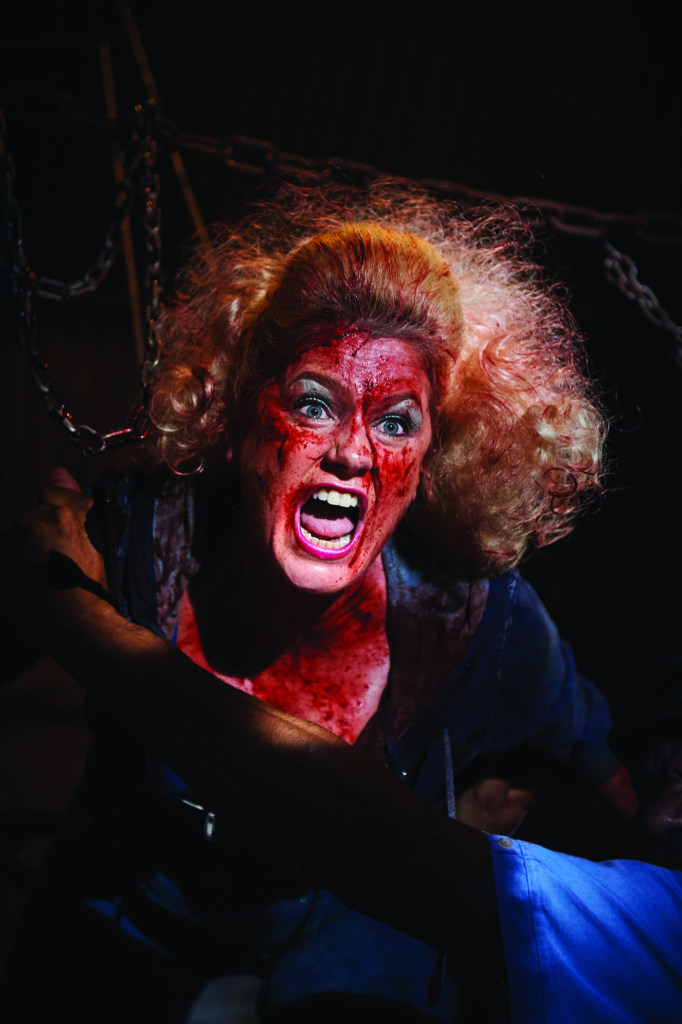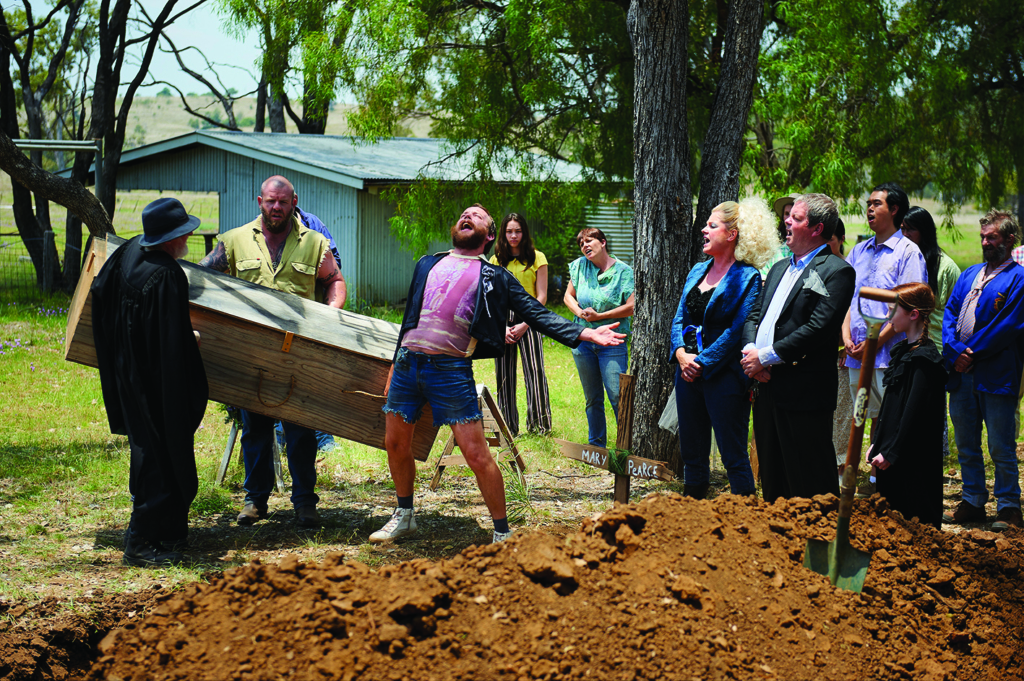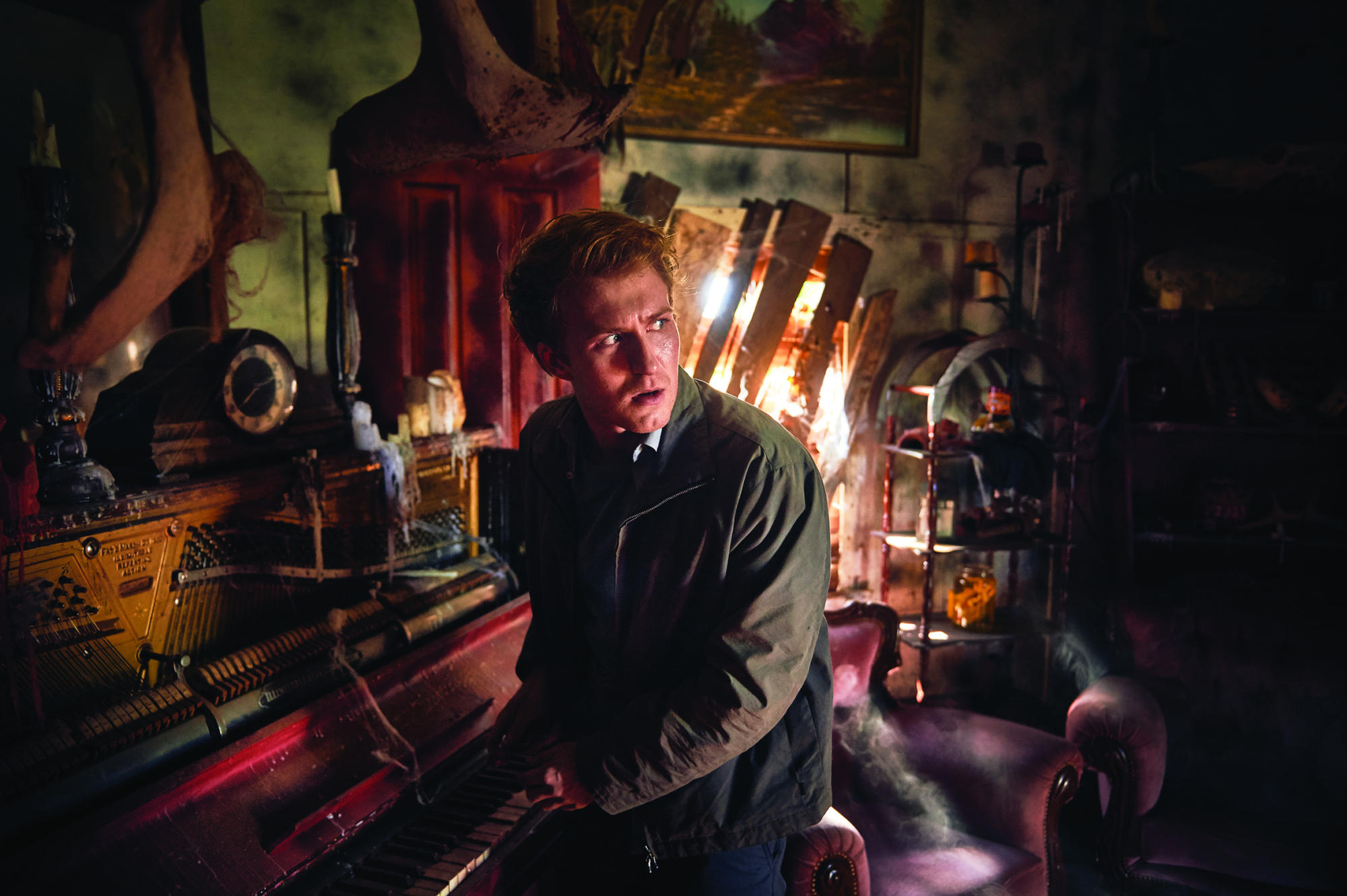A seething commentary on the global migration crisis, fish-out-of-water horror-comedy Two Heads Creek (2019) concerns faint-hearted Polish-British butcher Norman (Jordan Waller), who flees a hostile post-Brexit Britain with his melodramatic sister, Annabelle (Kathryn Wilder), to travel to the titular Australian rural town in search of their birth mother, Mary (Kerry Armstrong). Directed by local filmmaker Jesse O’Brien and scripted by British actor Waller, it’s a film that both knowingly embraces and – thanks to its partially international perspective – overcomes genre-film clichés regarding Australian aggression towards outsiders.
I talk to producer Judd Tilyard about the challenges of authentically depicting Aussie national identity on screen and achieving a tonal balance between horror and comedy, and why it’s crucial to understand rather than undermine genre audiences.
Oliver Pfeiffer: What attracted you to Jordan Waller’s script for Two Heads Creek?
Judd Tilyard: I think it was the international perspective on Australian culture. I’ve done a lot of travelling overseas, and so when I see Australia I tend to see it through that richness of a slightly more international perspective, as well as the national [perspective derived from] being here. What I really appreciated about the script was that it brought that same charm to it: it wasn’t just portraying Australia the way that a lot of films [do]; it was having fun, with a cheeky sense of humour that I could very much connect and relate to. It was also doing things with a little bit of that dry UK cynicism at times, [which] I felt was a great way of seeing into the richness of Australia and [its] landscape. One of the things we [initially] discussed was looking for projects that worked within regional Australia […] That’s part of a belief within myself that, for films to really travel and do well, they need to have a very firm identity and authenticity.

What do you think is the key to achieving that kind of authenticity on screen?
There’s a lot of films [shot here] that are just trying to be [Hollywood] narrative films – some of them literally with American accents, and others where there are still Australian accents and Australian things but the heart is not Australian in any way. I really enjoy making films that have a very distinctive identity baked into them. One of the appeals of shooting in regional areas and about regional subject matters is [that] you get a different take on Australia. [It’s] not necessarily more true to Australia than […] urban culture, but there’s a flavour to it – [one] that’s a little bit more rustic and richer – that I think travels well, and that, as Australians, we all relate to. Even if you’re from the city, there’s that sense of the land and that sense of giant spaces, the outback and the bush. I grew up in a country town, so I had that sealed within me.
With Waller being British, how well do you think he grasped Aussie culture and humour from a writing perspective? Was there anything you had to fine-tune about that?
It’s written by an Englishman who’s never been to Australia, so the very first draft had quite a few things like … ‘No, no, no – you’ve got this wrong. We would never say it this way.’ Some of the humour works because it’s a British perspective of Australia. If [characters are] making a ‘That’s not a knife!’ joke, that works because they’re from the UK and that’s what they know about Australia – that’s the type of joke they make, and, as Australians, we’re all familiar with [it]; we can laugh about it but it’s also a bit of a groan for us, whereas it’s a genuine laugh for [audiences from] the UK or from somewhere else. So getting that balance right was [the challenge]. Some of the lines – like when [Annabelle] says, ‘They’re just Australian,’ or, ‘This country’s fucked!’ – are sentiments that I feel are actually very Australian, even though they’re coming out of [a British character’s] mouth. There’s definitely a feeling of, ‘Yeah, as Australians, we are willing to laugh at ourselves.’ […] So there’s a few times where it was just a case of [Jordan being] curious as to how far we could go.
‘I really enjoy making films that have a very distinctive identity baked into them. One of the appeals of shooting in regional areas and about regional subject matters is that you get a different take on Australia.’
— Judd Tilyard
Tell me about bringing Jesse O’Brien on board as director and what attracted you to him.
Jesse came onto the project after we’d done a couple of passes on drafts […] I saw Jesse’s short film for Arrowhead [2016] before he made the feature [version].[1]That feature, O’Brien’s first,concerns a mercenary stranded on a desert planet who is challenged to complete a data-stealing mission. The original short, Arrowhead: Signal, was made in 2012. He tried to run a crowdfunding campaign to make that feature, and, based on that, I said, ‘I wouldn’t give money for your crowdfunding campaign, but I’ll fund the feature if you want to make it.’ We were actually [already] in talks about that when he had the SYFY channel come up to him and say, ‘Well, we’ll give you a couple of hundred grand if you make it,’ so he ended up taking that [whereas I would have] made it on a micro budget […] I was very interested in him, thought he had a lot of talent and was great at expressing himself. While Arrowhead definitely had some weaknesses – a lot to do with the shooting schedule and the budget – it still showed a lot of promise to me. So I was obviously very interested in working with Jesse, but [Two Heads Creek] was a very different film for him. We’re talking about something that is comedy-driven and horror-comedy, and his background was basically in straight sci-fi/adventure, so it took a few conversations where I said, ‘I’ve got this project, it’s moving forward and I think you’ve got the talent and would be capable of doing it if it’s something you felt connected [to] and interested in.’ […] Fortunately for us, he did connect to the script, and a lot of the development and nuances within that period were from [him] either directly talking with Jordan or with us collectively, to go over what the tone and the voice would be.
It’s quite an unusual situation to have the scriptwriter as the lead actor in the film too. Was Waller always attached to play the main role?
It has certainly happened with other films, but not so much in this genre. Usually it [happens more with] drama films; it’s actors writing autobiographical, personal touches. This wasn’t that. The story is about family, and family is obviously something that does mean a lot to Jordan,[2]Waller was conceived via sperm donation and brought up by a trio of women. See Joanna Moorhead, ‘Jordan Waller: “I Told Friends I Had Three Mums”’, The Guardian,23 December 2017, <https://www.theguardian.com/lifeandstyle/2017/dec/23/jordan-waller-victoria-actor-gay-parents-interview>, accessed 10 August 2020. so that’s a universal and common theme […] but no, as an idea and as a concept, it was just something that came to him that he was able to put down.

[Jordan] always had in mind that he wanted to play the role, and that was one of the things that we discussed from the outset: that it was a role he was writing to play […] From my perspective, that was great, because it means you’ve got an actor [who] genuinely understands the story – someone who’s committed to the film, committed to the story, understands the characters and brings a richness to it. Also, he was confident and not an insecure writer or actor: he was able to take feedback throughout the entire project, all with the goal of making the best film possible. He was also able to wear a writer’s hat when he needed to write but put it down and wear an actor’s hat when he needed to act. When we were shooting the film, there were discussions about [plot] points that took place, but, for the bulk of it, it really was him just turning that side off in order to focus on being the lead in the film.
You have a range of distinguished Aussie talents in the cast, too.[3]Two Heads Creek’s ensemble includes Gary Sweet, Stephen Hunter, Helen Dallimore, Kevin Harrington, Don Bridges and Gregory J Fryer, among others. How easy was it to secure those names?
It’s a real tribute to the script and to Jesse. He spoke and met with a lot of them before they signed on, and there was a definite interest in the material because it felt a little bit different from a lot of the stuff that comes through. What I think really sold them was hearing Jesse’s vision for it. [Their response] was, ‘Okay, you’ve got an interesting script, but you’ve also got a director [who] can see that potential within the script and is going to make those interesting choices.’
‘If you’re wanting to gain attention and traction with a genre film, it’s great, because there is this built-in audience; but you have to be loyal and authentic to what that audience want to see and what gets them excited.’
— Judd Tilyard
From a visual perspective, the blood and make-up effects are very confronting, in a knowing way. Is this something you felt was a requirement to satisfy the built-in genre audience?
My background is primarily in genre films, so it was definitely something we looked at regarding what is the release and what is the outlet for this film. If you’re wanting to gain attention and traction with a genre film, it’s great, because there is this built-in audience; but, again, you have to be loyal and authentic to what that audience want to see and what gets them excited – you can’t shy away from violence if violence is what’s needed on screen. You also can’t be purely exploitative of the violence for the sake of it because, again, they pick up on that. It’s a really fine line to get that right, particularly with comedy, because it works best if you know that [the horror and humour] are working together, when the suspense puts you on the edge of your seat and then the [comedy] takes you off it and lets you relax a little and breathe in […] It’s about getting an audience to have moments that they come away from [the film] talking about – moments they remember and they want to tell their friends about. That was one of the things that we were doing with the revisions of the script.

You also talk about the kills and whether they were interesting […] Were they visually different to the other kills in the film? How much is ‘graphic’ that makes you wince, [and] how much is ‘graphic’ that makes you laugh? Getting all that right [means] that your audience is with you and enjoying the film. The key to a comedy-horror film is that you enjoy it – it’s a ride, like a roller-coaster. In many ways, it’s got that ‘popcorn cinema’ feel to it. I think that’s why filmmakers like Peter Jackson – [with] Braindead [1992], and that kind of comedy-horror – understand popcorn audiences; they understand what cinemagoers can get behind and enjoy, and I think that’s a skill that Jesse brought to it, especially in the edit […] Getting that rich tonal balance that genre audiences can appreciate [enables a film to] hit a mark for a festival but also really resonate [with] an audience.
Endnotes
| 1 | That feature, O’Brien’s first,concerns a mercenary stranded on a desert planet who is challenged to complete a data-stealing mission. The original short, Arrowhead: Signal, was made in 2012. |
|---|---|
| 2 | Waller was conceived via sperm donation and brought up by a trio of women. See Joanna Moorhead, ‘Jordan Waller: “I Told Friends I Had Three Mums”’, The Guardian,23 December 2017, <https://www.theguardian.com/lifeandstyle/2017/dec/23/jordan-waller-victoria-actor-gay-parents-interview>, accessed 10 August 2020. |
| 3 | Two Heads Creek’s ensemble includes Gary Sweet, Stephen Hunter, Helen Dallimore, Kevin Harrington, Don Bridges and Gregory J Fryer, among others. |





